An electric atmosphere. Great sightlines. Lively glass panels and boards that would rattle and reverberate from solid body checks. There was so much to love about Buffalo’s Memorial Auditorium.
We take a moment to pause and turn back the clock to reminisce about the earlier years of the beloved Blue & Gold.
A Love Affair Is Born
The Aud was like a magnet that pulled fans and players closer together. It began when Seymour H. Knox III dropped a ceremonial puck between the Buffalo Sabres’ Floyd Smith and the Montreal Canadiens’ Jean Beliveau at the first regular season game played in 1970. From that point on, the building nurtured a strong connection between the team and its fans. As Knox put it, The Aud became, “an old friend.”
With a rink that was smaller than today’s regulation size of 200 by 85 feet, measuring only 196 by 85 feet, its intimate surface further united players and fans.
Entering the Aud
After entering the main entrance and having your ticket ripped in half while going through the turnstile, fans were greeted by program-hawking men and women, “Programs, get tonight’s hockey lineup. Get your lucky number!”
From there, one walked past glass-encased signage boards with divisional standings and league scoring leaders. Names like Orr, Esposito, Bucyk and Perreault always seemed to be there. And like a proud parent, Bert’s name and stats would be in red letters, popping out from the others in black.
Walking through the dark and winding ramps to get to your seats was like meandering through a series of intermingling caves. A mustiness hung in the hallways as both popcorn and smoke filled the corridors. Along the way, you’d hear the common refrain of, “Cold beer, here!” from vendors.
Nothing but a sliding, collapsible fence separated the home and visiting players from fans as they came out of the dressing room through the concourse onto the ice. Fans could go down to right outside the locker room to get autographs. As a hockey-obsessed kid, it was mesmerizing to see your heroes so close. If you were lucky, you’d get a dinged-up stick or a practice puck.
An Electric Atmosphere
The building had life. And when the raucous sellout crowds of 16,433 fans filled it, their voices made the building shake. Even the thousands of acoustic cylinders suspended from the ceiling would sway back and forth. It was an intimidating place for visiting teams. And when the Toronto Maple Leafs or Habs were in town, it seemed extra special.
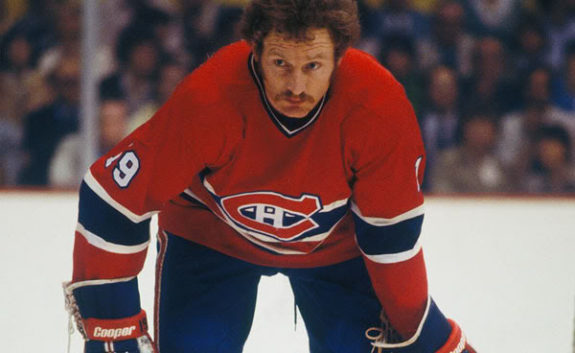
Fans, Characters, and Traditions
The devoted fans and characters in the crowd made every game an experience. They were every bit a part of the game’s experience as the game itself.
There were games where the crowd would seemingly will the team to score one more goal, chanting, “seven… eight… nine… we want TEN!
There was the peanut guy selling brown paper bags of peanuts outside the Aud. The fans would decorate the walls with signs. The chant after a missed call that “Harris is a bum.” Who could forget ‘The Earl of Bud?’
A look up at the scoreboard behind each goalie showed the shots on goal, the time, and the temperature outside. As the weather became colder and the temperature dropped, inevitably you’d eventually hear, “the Skyway is closed.”
After the game, there was the ‘pop, pop, pop’ of empty SportService beer cups echoing through the ramps. If it was a win over the rival Boston Bruins, Leafs or Habs, the mocking chant of “Na na na na, Na na na na, hey hey, goodbye” could be heard on your way out.
Historic Moments
The on-ice memories occurred almost nightly–whether it was one of Gilbert Perreault’s famous end-to-end rushes that brought fans to their feet, celebrating one of Dominik Hasek’s countless acrobatic saves or witnessing Jim Schoenfeld take Wayne Cashman of the Boston Bruins through the Zamboni doors. Taking in a game was a treat.
And who could forget Jim Lorentz knocking a bat out of the air with his stick in the notorious ‘fog game’ against the Philadelphia Flyers on May 20, 1975 in Game 3 of the Stanley Cup Final? Rene Robert scored the game-winner in overtime.
You may also like:
- Sabres Sign Ukko-Pekka Luukkonen to 5-Year Deal
- Buffalo Sabres’ Worst Trades Ever
- 3 Buffalo Sabres That Need to Step up in 2024-25
- 9 NHL Teams That Missed in Free Agency
- Top 3 Sabres With Underrated Fantasy Hockey Value For 2024-25
The Aud hosted the Soviet Army team in 1976 (the Sabres won, 12-6), again in 1980 (the Sabres won, 6-1) and in 1989 (the Sabres won, 6-5).
The Aud was part of history when Wayne Gretzky broke Phil Esposito’s record by scoring a natural hat trick against the Sabres on February 24, 1982. Gretzky’s first goal was number 77, quickly followed by numbers 78 and 79. The Edmonton Oilers won the game, 6-3. Perreault, the Sabres’ captain, scored a hat trick himself.
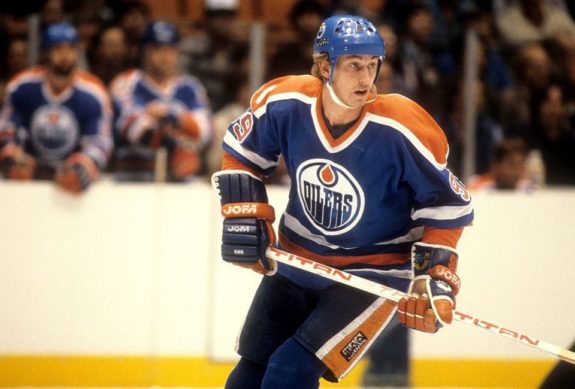
In 1986, Gilbert Perreault scored his 500th goal against Alain Chevrier of the New Jersey Devils. His teammates, encouraged by Mike Foligno and Phil Housley, then picked him up on their shoulders and skated around briefly.
The Aud played host to a magical 1992-93 season, with Alexander Mogilny and Pat LaFontaine creating highlight films and electrifying the crowd night after night. Mogilny finished with 76 goals and 51 assists for 127 points in 77 games. LaFontaine lit the lamp 53 times to go with 95 assists and 148 points. Rounding out the line was Dave Andreychuk, who although traded before the season’s end, had 54 goals that year.
Other than Wayne Gretzky, Jari Kurri and Glenn Anderson, in both 1983-84 and 1985-86, it marked the only time in league history that one team had three 50-goal scorers on the same team in the same season. All have been inducted into the Hockey Hall of Fame, with the exception of Mogilny.
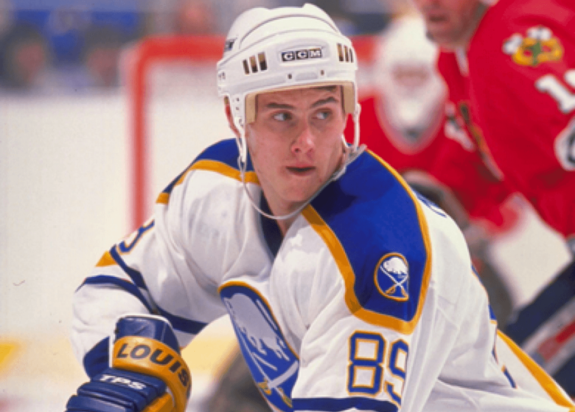
Then there was the almost legendary ‘May Day’ overtime goal in 1993 when Brad May deked around Ray Bourque, went wide around Andy Moog and flipped the puck into an empty net. It cemented a Sabres sweep of the Bruins, advancing to the second round of the playoffs for the first time in ten years.
Who could forget Game 6 of the Sabres best-of-seven series against the New Jersey Devils? Facing elimination, Dave Hannan backhanded a shot past Martin Brodeur in quadruple overtime, while the Dominator made 70 saves for a 1-0 win. The game ended at 1:52 a.m.
Winning in Defeat
In the quarterfinals of the 1973 playoffs, the Sabres lost to the Montreal Canadiens, four games to two. As Game 6 was winding down, the fans couldn’t help but acknowledge their love and appreciation for their start-up franchise. What started as a slow chant of “Thank you Sabres” finished in a heartfelt, thunderous cheer.
Two years later, the same admiring chant came about at the end of Game 6 of the Stanley Cup Final, even though the Sabres came out on the wrong side against the Flyers.
Seat Colors
The Aud’s seating started with the lower golds against the glass, followed by the upper golds, reds, lower blues and upper blues.
While some fans claim to raise the roof, the team actually did just that. In 1971, the Aud’s roof was raised 24 feet, adding a top bowl of orange-colored seats. This renovation cost $8.7 million-nearly three times the cost of the original structure! Ask around and you’ll find these nosebleed seats to be crowd favorites. With steep-angled stairs and seats as low as seven dollars, they offered some of the best views in hockey.
The affordable seats came at a price–standing up and cheering after a goal often felt like you were standing at the edge of a cliff. It was almost like a Goodyear Blimp view of the game, yet came with an unspoken, close-knit vibe as everyone knew they were only one step away from tumbling down the stairs, Nordberg style. Fans sitting in these brightly colored seats, teetering high above the ice shared an unspoken pact that getting up from your seat needed to be kept at a minimum–it could be life or death as you passed by seats to get to the stairs.
An All-Star In-Game Presentation Lineup
Though hardly French Canadiens, the trio of Milt Ellis, Norm Wullen and Joe Byron were the franchise’s original famous threesome. It was a simpler time, before screeching announcers became the norm and every timeout was filled with blaring music and sponsorships.
Milt’s smooth voice was synonymous with the Aud. He served as the Sabres public address announcer for 27 years, sitting at his desk between the two penalty boxes beginning in 1970. Prior to that, he was the announcer for the AHL’s Buffalo Bisons. Milt was inducted into the Buffalo Sabres Hall of Fame in a 2008 pre-game ceremony along with player Dave Andreychuk. He was a Buffalo institution and as humble and sincere a man as you’ll ever find.
First Buffalo goal, his fifth of the season, scored by number 11 Gibert Perreault. Assists to number seven Richard Martin, and number fourteen Rene Robert. Perreault, from Martin and Robert. Time of the Goal, 5:24.
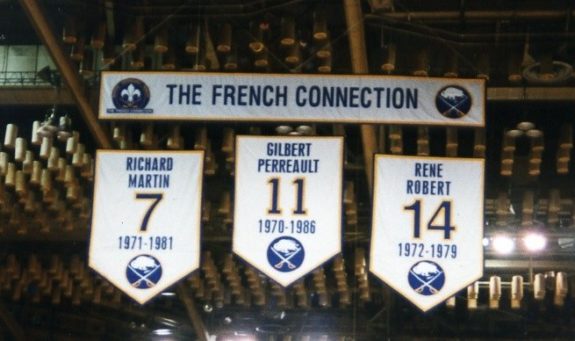
Well before cell phones were invented, Milt would often page doctors during a game, asking them to call their answering service.
Wullen was the Sabres’ original organist, tickling the keys from 1970 until he retired in 1985. He had a knack for sensing the crowd’s energy and punctuating the game with his own. His repertoire was vast, playing everything from ‘Sabre Dance’ to Hava Nagila and the Addams Family theme song.
Tenor Joe Byron sang both the American and Canadian national anthems, always starting with the Canadian anthem. This was a decision made by the original owners of the franchise, the Knox brothers. They acknowledged that the Sabres drew from Canada and they also recognized the roster was mostly composed of Canadian players.
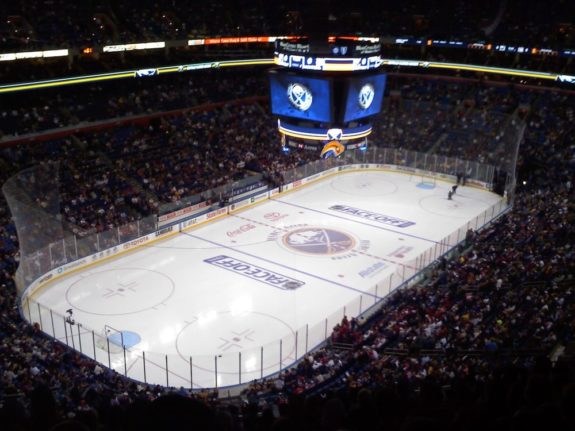
Once the team moved into HSBC Arena, what is now known as KeyBank Center, none of these men continued to work. It was the end of an era.
Closing Down the Aud
The final game at the Aud was April 14, 1996 against the Hartford Whalers, a game in which the Sabres won, 4-1. Everyone in attendance or even watching on television felt goosebumps as Pat LaFontaine put the ceremonial final puck in the net and the lights went out to close the Aud.
The Aud closed in 1996. Before demolition started in Jan. 2009, many items were salvaged or auctioned off. By July, the building was completely gone.
For a comprehensive look at photos of The Aud, check out photographer Joe Cascio’s site.
